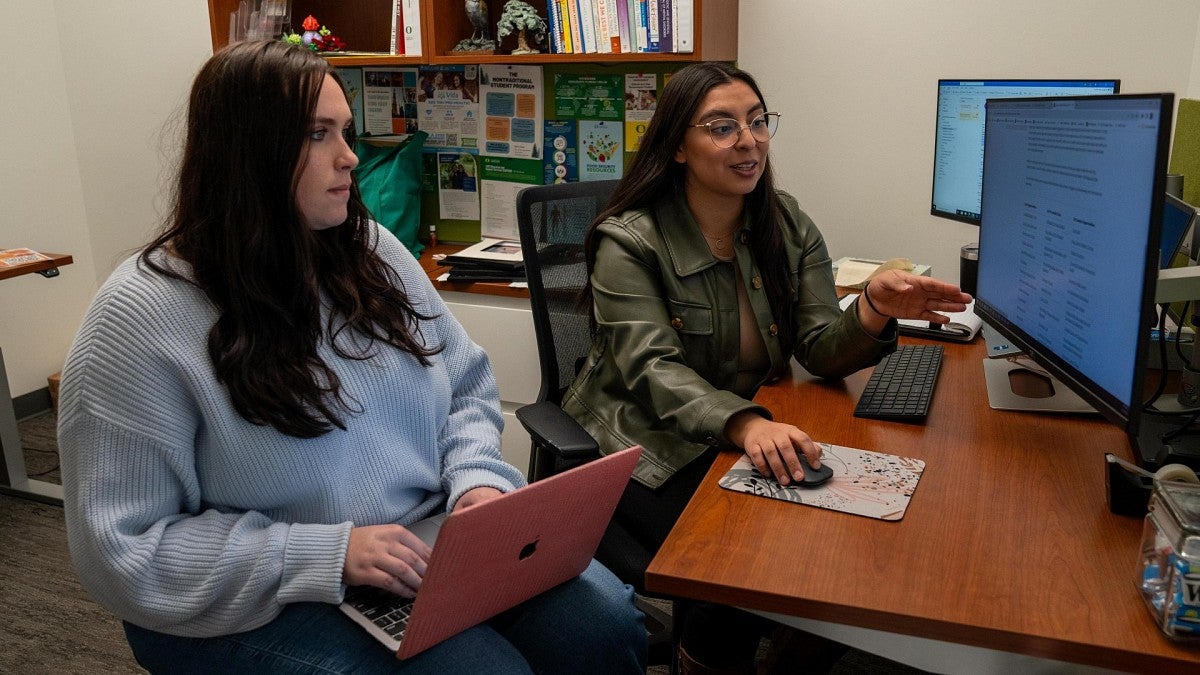The pathway to medical-related schools can be intimidating, filled with applications, essays and interviews. But advisers, as well as a re-designed one-stop Pre-Health Advising Program website, are guiding more than 4,000 University of Oregon pre-med students planning to attend medical schools after undergrad.
Pre-health students typically major in human physiology, biology, neuroscience, psychology, biochemistry, chemistry and multidisciplinary sciences. The advising program supports students whose professional goals are related to pre-med, physical therapy, dentistry, veterinary sciences — or any other health profession.
Although the UO doesn't have a medical school, the program's recently re-designed website can guide students as they plan the needed coursework to be on track for whichever medical school they plan to attend. And pre-health students can lean on expertise from the program's two advisers to make their applications for medical school competitive.
"UO students benefit tremendously from pre-health advisers' extensive knowledge of how to put together a strong application for programs in the health care field," said Jamie Bufalino, associate dean for student success in the College of Arts and Sciences.
Sonia Gordillo explains that the program is organized into four key stages: explore, plan, prepare and apply. Gordillo is one of two advisers who guide students through the pre-health process, starting from exploring potential health careers to preparing for the intricacies of the application process for advanced degree programs, such as medical school.
Gordillo said pre-health advisers guide students through the process, starting from exploring potential health careers to preparing for the intricacies of the application process for medical and graduate schools. The program offers various services, including one-on-one appointments, workshops and application assistance.
"Knowing about our services early on is important so that students can establish a relationship with us, get access to resources and know what to look for," Gordillo said. Students can also use the program's Canvas site to access information and announcements, as well as engage in discussions with peers and advisers.
Diyar Dezay, a pre-dental senior majoring in neuroscience in the College of Arts and Sciences, highlighted the program's pivotal role in shaping his academic and career path. He initially discovered Gordillo and the program through the UO adviser website, seeking guidance as a first-generation college student.
"Sonia took me under her wing," Dezay said. "She would always send me stuff to do, be on the lookout for opportunities for me to better my resume, as well make sure I was being aware of everything that's going on timeline-wise."
Dezay's journey underscores the program's impact in helping students define their career goals. "If it wasn't for the pre-health advising, I think it would have taken me five or six years to complete the major and the career path that I want to take," he added.
The program's commitment to staying in tune with the ever-changing landscape of health professions is evident in the continuous efforts of the pre-health advising team. Gordillo and Amanda Kong, the other pre-health adviser, are both members of the National Association of Advisors and Health Professions.
As the program continues to evolve, it is commitment to providing useful resources and personalized guidance, ensuring that students are well-equipped to thrive in the competitive world of health graduate admissions.
"It's a really rewarding feeling to help them with that process," Gordillo said. "I love the fact that I get to scaffold the intricate process of health care and graduate school admissions. I help them realize the strengths they've developed through life, professional and educational experiences, and how to communicate these strengths in their written application and mock interviews."
—By Codi Farmer, College of Arts and Sciences
—Top photo: A student talks with pre-health adviser Sonia Gordillo


